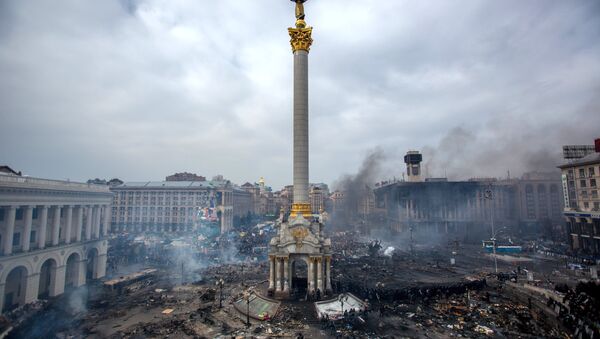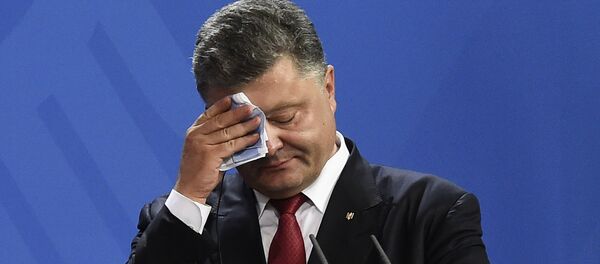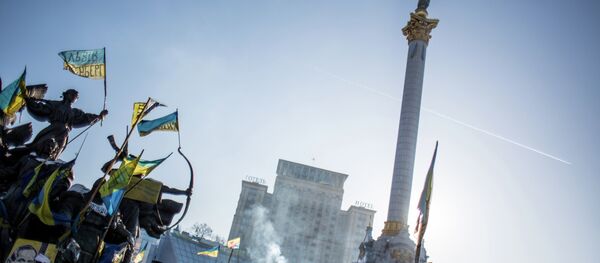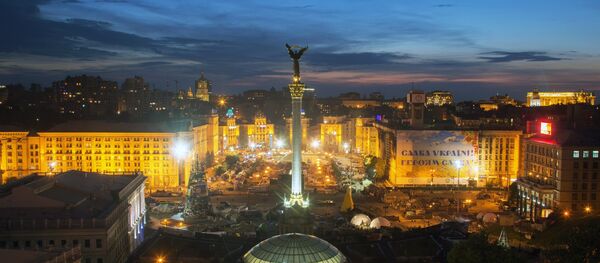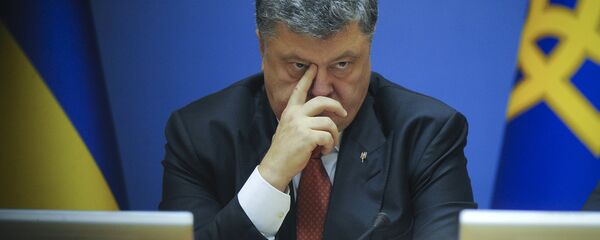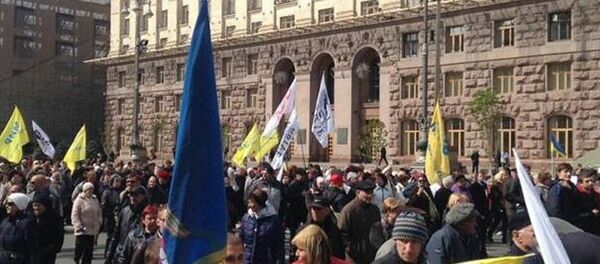February 22 marks the day when two years ago Ukrainian president Viktor Yanukovych had to run for his life to avoid the wrath of Euromaidan activists.
Yanukovych's ouster was preceded by signing on February 21, 2014 of an agreement between him and the Euromaidan leaders. The agreement was brokered by ministers of foreign affairs of France, Germany and Poland and aimed to end the crisis.
Among other things it provided for the conflicting parties’ immediate disarming and a cessation of hostilities, and for an early election, to be held no later than December 2014. But as the Euromaidan leaders took the agreement to the protesters crowding Kiev’s main square, they were shouted down by right-wing activists who rejected it and gave the embattled president an ultimatum: surrender or we will storm your headquarters.
Yanukovych, who had put his trust in the agreement guaranteed by the European ministers and disarmed, had no choice but to flee. Ukraine descended into more violence and eventually a full-blown civil war.
In June 2014 a new, US-backed, president was elected, who promised to end the war quickly. But it has been simmering to this day. The Yanukovych's ouster was the culmination of a long-running effort of the West, led by the US, to subdue Ukraine. The effort has failed, but in the process the West destroyed the country.
At a deeper level, the Euromaidan was a regime change operation orchestrated by the US, whose involvement in the coup is well-documented. It was Washington that ended up the Euromaidan’s main beneficiary, controlling as it is all the branches of power in Ukraine. Now the American ambassador runs Ukrainian politics like a viceroy.
The US-backed coup has had had the effect of subverting the electoral process and installing a government fully amenable to US wishes. In its essentials, the coup amounts to the West’s aggression against the Ukrainian people. By blowing up Ukraine the West also called into question the validity of the post cold war order in Europe. Washington had long been nurturing designs on Ukraine. Jutting deep into Russia's south flank, Ukraine’s eastern part resembles a dagger aimed at the heart of Russia, a tantalizing vision for any NATO planner.
But there was one problem: the Ukrainians would have none of that. Polls consistently showed a supermajority of the Ukrainians to be against joining NATO. Not that it was something that would deter the US.
Rather than respect the will of the people, it presumed it had a veto over the Ukrainians’ choice of direction for their country. So it kept pushing to undermine the country's non-bloc status and eventually succeeded in that.
Ironically, Yanukovych had been a believer in Ukraine’s EU integration that eventually proved his undoing. He saw it, in particular, as a bargaining chip in his game with Russia that he could use to extract more concessions. To him it was also a guarantee of a future good life once he would be done with Ukraine. For its part, the West protected Yanukovych from attacks by the Ukrainian pro-Western opposition as long as he followed the Euro-integration line.
Yanukovych personally led the EU integration process and, when necessary, pushed the parliament to pass critical laws. He ignored Russia’s warnings that a free zone with the EU would, for obvious reasons, end Ukraine’s free trade zone with Russia, with dire consequences. It’s not that his vision was completely altruistic. His plan was to see who would pay more to have Ukraine in its camp: the West or Russia. He needed money, and lots of it, to pay salaries and pensions at home so he could get re-elected in 2015. But when Ukraine asked for USD 20 billion to compensate the cost of the EU deal, the Europeans balked.
The Russian offered USD 15 billion and a gas price discount. That settled it.
The ousted president ran a corrupt, but mostly liberal regime. Unlike in the present-day Ukraine, no one had a monopoly on truth, freedom of speech flourished, and dissent was not suppressed. Yanukovych’s main goal was to remain in office for as long as possible while advancing the economic and political interests of his clan. His immediate task was to win the upcoming 2015 presidential elections.
Yanukovych managed Ukraine’s complex ethnic landscape by balancing the Russian-speaking east of the country against the Ukrainian-speaking west. That way he hoped to maintain peace in the country and generate additional votes on the election day. Elected mostly by the voters from Ukraine’s more populous south-east on the pledge of giving Russian speakers equal rights, he never quite lived up to that promise.
Once in office, Yanukovych assumed a sort of neutrality, paying lip-service to the de jure exclusive status of Ukrainian, while not doing much to counter the de facto popularity of Russian. That earned him the scorn of the easterners and the hatred of the westerners.
The association with the EU was supposed, among other things, to placate the western voters who despised Yanukovych for his policies and background.
It also needed to make up for the loss of the eastern voters disillusioned over the president’s failure to deliver on election campaign promises. In foreign policy balancing was equally the name of the game.
Yanukovych had steered a careful course between the West and Russia, all the while seeking to maximize his political and economic gain. He pressed on with the EU association in hopes of getting it to underwrite his 2015 re-election bid.
At the same time he courted Russia to see if it would be willing to pay more. By moving close to Europe he alarmed Russia, which saw his actions as undermining the CIS’ economic integration.
The Kremlin warned that, since much of Ukraine’s trade, and nearly all of its value-added exports, went to Russia, loss of the CIS markets would result in an economic slump and mass unemployment, and would eventually reduce Ukraine to the status of a commodity appendage to the EU.
The EU negotiators, led by Lithuania’s president Dalia Grybauskaite, a former Soviet party boss turned strident Russophobe, had no time to lose. It was critical to get the deal done still in 2013, while Lithuania held the EU presidency.
When Yanukovych went to Vilnius for a signing ceremony on November 29, 2013, he abruptly reversed himself. As a reason he cited the EU refusal to provide USD 20 billion to compensate Ukraine for the cost of joining the EU trade zone.
Asked by Ukraine to consider options to make the deal easier on Ukraine, the EU rejected any proposed alternatives, such as a three-way deal between Ukraine, the EU and Russia. That was hardly a smart move.
Given Ukraine’s deep economic integration with Russia, all options should have been seriously considered. No ideal solution might have been found, but in the very least Ukraine’s break-up and the civil war could have been avoided.
Needless to say, the Ukrainian debacle will forever remain a blot on Grybauskaite’s reputation as a politician. The Euromaidan was born of the frustration of a segment of Ukrainian population at the slow pace of assimilation of those whom they saw as supporters of what they called a “regime of internal occupation”.
The struggle against internal occupation has been going on without respite for 25 years of Ukrainian independence. With the advent of the Maidans it turned violent.
The Euromaidan was also a protest against economic deprivation and corruption, but those were not, as the current situation in Ukraine testifies, the main factors. Also, many Ukrainians joined the unrest out of desperation; unable to get a better life through elections, they hoped to obtain it through street violence.
Finally, many in their pro-European fervor did not even realize that what was at stake was a trade deal with the EU, not a membership. Yet what came after the Euromaidan proved far worse than what went before. The country found itself in the throes of a civil war and subject to mob rule.
Lack of personal security and crushing poverty became a pressing concern for most Ukrainians.
A full-on political oligarchy, exemplified by the president-oligarch, as well as corruption dwarfing that of the Yanukovych government, became the norm. The inability of the new regime to rule and mounting popular discontent threatens further unrest.
When Ukraine will be able to recover is uncertain. What is clear, however, is that it will remain a fragile state for a long time to come, dependent on financial and other assistance from its neighbours. Such is the outcome of the crisis sparked by the West in Ukraine that nearly destroyed the country.
Ukraine may survive, but it will never be the same again.
